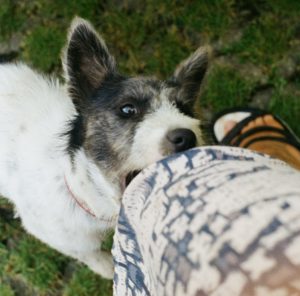Atlanta Dog Bite Lawyer
Every year, according to the Centers for Disease Control and Prevention, over four million of us in the United States are bitten or otherwise injured by dogs or other pets. If not treated properly and immediately, dog bites can cause nerve injuries, disfigurement, and a number of diseases. Parents should know that the most frequent victims of dog bites are children from ages five through nine.
Dog bites are a serious medical concern, and if you’re injured by a dog or by another animal, it’s imperative to discuss your case at one with a good personal injury attorney. If a dog or any other pet belonging to another person bites or attacks you or your child in the state of Georgia, will you be able to recover damages from the pet’s owner? Like almost every legal question, the answer is, “It depends on the details of the case.”
What is Georgia’s Controversial Dog Bite Law?
Georgia has perhaps the most complicated and controversial dog bite law in the nation. If you or your child should become the victim of a dog bite or any other type of animal attack in the state of Georgia, speak at once with an experienced Atlanta dog bite attorney at Spaulding Injury Law.
The Georgia law regarding dog bites has been controversial because a pet owner is held liable for the actions of a dangerous dog (or any other dangerous pet) only if the owner was aware of the dog’s dangerous proclivities. In the past, Georgia’s courts have cited the “first bite rule” – that the dog had previously bitten someone and the owner knew about it.
However, in March 2017, the Georgia Supreme Court determined that if a dog has previously snapped at someone – without actually biting someone – that could be sufficient to indicate that the owner knew that he or she owned a dangerous animal. One attorney in the case said the court’s ruling “recognizes that a snap is nothing more than a bite that missed its target.” Thus, it should be easier in the future for Georgia dog bite victims to win compensation for their dog bite injuries and their related expenses and losses. To prevail with a personal injury claim after a dog bite or any other animal attack in Georgia, the victim (called the “plaintiff”) must prove:
- that the pet was dangerous or vicious
- that the pet’s owner (called the “defendant”) knew of the pet’s dangerous tendencies
- that the defendant was negligent in handling the dog or letting it roam free
Important Terms Defined
To understand how the Georgia dog bite law works, it’s important to know the meaning of the various terms used in the law. Here are some of those critical definitions:
- Classified Dog – A dog that has been classified as either dangerous or vicious
- Dangerous Dog – A dog that:
- Causes a substantial puncture of a person’s skin by its teeth without causing a serious injury; but a nip, scratch, or abrasion does not meet the requirements of this definition.
- Aggressively attacked in a manner that caused a person to reasonably believe that the dog posed an imminent threat of serious injury, although no such injury occurs; but barking, growling, or showing teeth will not meet the requirements of this definition.
- While off the owner’s property kills a pet animal; but not if the death of the pet is caused by a dog working or training as a hunting dog, herding dog, or predator control dog.
- Owner – Any natural person or legal entity, including but not limited to a corporation, partnership, firm, or trust, owning, possessing, harboring, keeping, or having custody or control of a dog; if the “owner” is a minor, then the term includes the parents or persons in loco parentis with custody of the minor
- Serious Injury – Any physical injury that creates a substantial risk of death, results in death, results in broken or dislocated bones, lacerations requiring multiple sutures, or disfiguring ragged tears, requires plastic surgery or admission to a hospital, or results in protracted impairment of health, including the transmission of an infection or contagious disease, or impairment of the function of any bodily organ
- Vicious Dog– A dog that inflicts a serious injury on a person or causes serious injury to a person attempting reasonably to escape the dog’s attack
No dog can be classified as dangerous or vicious based on actions that occurred while the dog was engaged with a law enforcement officer or military officer carrying out official duties as a law enforcement or military dog. No dog can be classified as dangerous or vicious if the injured person was trespassing, abusing the dog, or committing a crime against the person such as murder or assault under Georgia Code Title 16, Chapter 5
What Damages Can I Recover for a Dog Bite in Georgia?
Under Georgia’s dog bite law, a victim can receive compensation for financial losses and pain and suffering. In rare cases, a victim may also receive punitive damages where the defendant acted with total and willful disregard for the safety of others. In more detail, these damages are:
Special (or Economic) Damages – Special damages are the actual, out-of-pocket financial losses a victim incurs due to medical expenses, property damage (including clothing, jewelry, etc.), lost income, and, if the victim died, funeral and burial expenses. Note that past and future medical expenses, such as future surgeries, and future income loss due to loss of earning capacity, are included in this section where the victim is disfigured or disabled.
General (or Non-Economic) Damages– General damages compensate the victim for non-financial losses, including physical and mental pain, emotional suffering, emotional distress, and loss of companionship if the victim dies. The amount awarded is decided by the jury or through negotiations with the defendant’s insurance company. Georgia law defines pain and suffering very broadly and does not impose a cap upon the amount the jury can award. Factors that the jury can consider in making its award include:
- Interference with daily life
- Inability to enjoy life
- Loss of earning and working capacity
- Disturbance and distress to the family
- Fear of the extent of the injury
- Physical injuries
- Mental and emotional distress
- Limitations of movement
- Medical bills and treatment involved
Georgia commonly uses the multiplier method to calculate general damages. In this method, the special damages are calculated, and a multiplier of 1 to 5 is applied. The more severe the injuries, the higher the multiplier. Thus, if special damages were $200,000 and the multiplier was 5, the general damages would be $1 million.
Punitive Damages – Punitive damages do not compensate the victim. Rather, they serve to punish the defendant and deter others from similar misconduct. Georgia law imposes a cap, with three exceptions, on punitive damages of $250,000. The only exception that would apply in a dog bite case would be an exception for the defendant who acts or fails to act with the specific intent to cause harm. In that case, there is no cap on the punitive damages that the jury can award. When filing the lawsuit, the victim must include the claim for punitive damages in the original pleadings and must plead specific facts supporting the damages. If the claim for punitive damages is not in the initial pleadings, punitive damages will not be available to the plaintiff under any circumstances.
There are separate stages in the trial for proving punitive damages. First, the plaintiff must prove by clear and convincing evidence that the defendant did harm the plaintiff and should pay punitive damages. In the second stage, the judge or jury decides how much the punitive damages should be. They will review the testimony and evidence relating to the defendant’s:
- past actions, including evidence that may have been excluded in the trial in chief
- likelihood of continued wrongdoing;
- subsequent remedial acts to prevent others’ future injury;
- earlier violent acts or other criminal behavior could be considered, and
- the defendant’s ability to pay damages.
The plaintiff must prove by clear and convincing evidence that the defendant’s conduct must have been willful, malicious, fraudulent, wanton, oppressive, or consciously indifferent to the consequences of their actions.
Where Does the Money Come From?
Your dog bite lawyer will, among their first tasks, search out sources of insurance for your injuries. The most common source of compensation in dog bite cases is homeowner’s or renter’s insurance. If the bite occurred on a business site, such as by a guard dog, the business’s insurance should cover your compensation. Owners of dogs deemed vicious in Georgia must carry a minimum of $50,000 in liability insurance.
How Do We Help Dog Bite Victims?
By conducting a thorough investigation and by building a compelling case built upon hard evidence and witness testimony, a skilled Atlanta dog bite attorney can often establish all three of the factors necessary for a dog bite victim to recover financial damages for medical care, lost wages, and possibly much more. Get the legal help you need after a dog attack. Speak to an attorney at Spaulding Injury Law by calling us at 770-744-0890. You may also contact the attorneys at Spaulding Injury Law by completing the contact form here on our website. We are ready and prepared to fight for the compensation – and for the justice – that victims of negligence need and deserve.
Atlanta Personal Injury Lawyers is located at 50 Hurt Plaza SE #1536, Atlanta, GA 30303, United.











